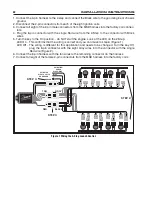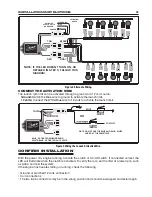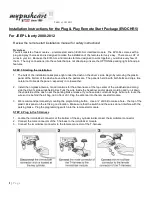
MOUNTING
The 2-Step Control can be mounted in any position but keep in mind to mount it so the rotary dials
are accessible for adjustments. Hardware is supplied for mounting. Before mounting the unit, con-
firm that the wiring harnesses reach their connections.
Parts Included:
1 - 2-Step Launch Control
1 - Harness
MSD 2-Step Launch Control
for Ford Mod Motors '99-On
PN 8734
1 - Tap
3 - Mounting Screws
Note: The 2-Step Launch Control is a low-rpm limiter that will not provide nor modify any over-rev pro
-
tection. The stock high rpm rev limiter will still be active.
The MSD 2-Step Launch Control is designed for Ford Modular Engines with Coil-on-Plug ignitions. The
2-Step Control will provide consistent launches and quick 60-foot times. RPM adjustments are made via
two rotary switches located on the harness side of the unit. The adjustment range is from 1,000 - 10,900
rpm, in 100 and 1000 rpm increment, an LED will illuminate when the launch rev limit is active.
Note: It is recommended to have the service manual for your vehicle.
Caution: Keeping the engine on a lower rpm limit may cause the Check Engine light to come on
and could potentially damage the catalytic converter.
8-WIRE CONNECTOR
TAN (8)
Signal Connections.
12-Volt Connection through this single Red wire.
8-WIRE CONNECTOR
RED
BLACK
Connects to a good engine ground or the negative battery terminal.
BLUE
Activation Wire. When grounded, the launch feature will be active.
3-WIRE CONNECTOR
WHITE/BLUE
Activation Wire. When switched to 12 volts, the launch feature will be active.
WIRING
LED
Note: Refer to your service manual for coil accessibility.
Parts Bag:
Note: The engine rpm must drop more than one third of the set launch limit in order to activate. For
example, if the launch limit is set at 3,000 rpm, the engine speed must drop below 2,000 rpm
in order for the launch limit to become active (one third of 3,000 rpm is a 1,000 rpm drop).
The built-in LED will illuminate when the 2-Step Launch Control is activated. It will also, illuminate
when there is no rpm signal.





















